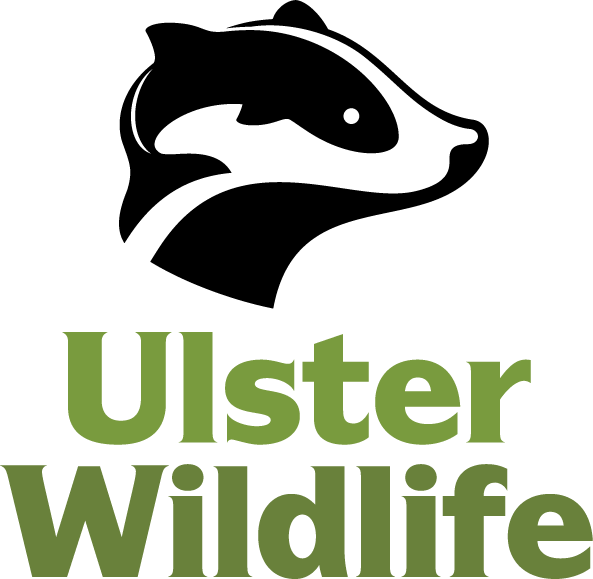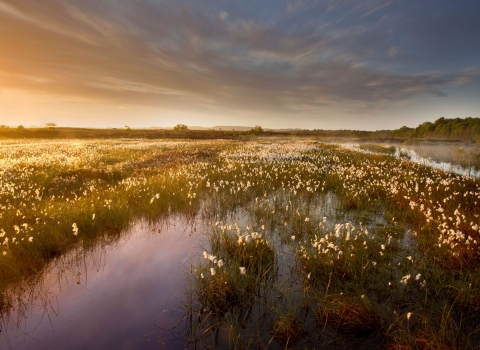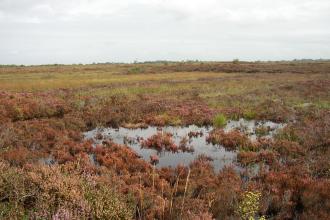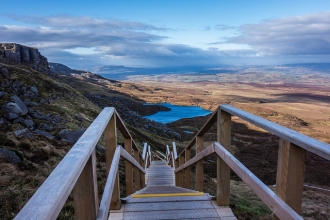Why are we facing a climate emergency?
The facts about climate change are clear and we are running out of time to avert dangerous climate breakdown. The climate and ecological crisis we face is not being taken seriously enough and it is now widely accepted that we need urgent and transformational change in our economy and society if we are if we are to avoid future catastrophe.
This transformative change will affect all of us and means we will have to change how we currently live our lives. But without this change, we are facing a very uncertain future and leaving a toxic legacy for our children and our children’s children – the time to act is now.
Locally, we continue to lose our most precious remnants of wild natural space - as part of the change we need ambitious natural climate solutions that capture carbon in our peatlands, meadows and woodlands.
What are we calling for?
- We must come together to restore our habitats on a landscape scale, and bring our seas back to life if wildlife is to thrive again. The damage must stop and the tables must be turned.
- It’s time to accelerate action on the climate crisis through restoring our natural world, not least our peatlands.
- It’s time for new laws that will truly give nature and people a safe and healthy future. We want to see clear commitments and measurable, binding targets for safeguarding our natural life-support systems: a plan that reflects the true value of nature to our future well-being.
- It’s time to decarbonise our economy – divest from fossil fuels and invest in renewables.
- A carbon neutral Northern Ireland by 2040.
What is Ulster Wildlife doing to tackle this climate emergency?
- We are working to protect and restore peatland habitats that naturally act as carbon sinks and take carbon out of the atmosphere. However, much of NI’s peatlands are no longer sequestering and storing carbon due to decades of unsustainable management practices, and instead have become a significant net source of greenhouse gases. Widespread drainage, afforestation and adverse management has resulted in 88% of peatlands in NI showing signs of degradation. Restoration of peatlands is an investment in a climate resilient future in NI – these restored habitats will continue to sequester carbon for future generations.
We are currently working on developing and implementing restoration and management plans for 13 peatland sites across Northern Ireland that will help to provide a nature-based mitigation for climate change.
We are also calling for:
- Creation of a NI Peatland Strategy that recognises the wide range of services these important habitats deliver for society and prioritises their protection and restoration with specific target for the 95% of the habitat area under positive management and under restoration to achieve a functioning state.
- Provision of sustainable long-term funding for peatland restoration and conservation to support and empower landowners and land managers to work in partnership with specialist technical expertise based on best practice methodology for peatland restoration.
- Ensure future agri-environment schemes prioritise and appropriately incentivise the sustainable management of these habitats, to maintain existing peat deposits and extent of intact active peatland habitats.
- End the use of peat based horticulture products; support the industry to implement responsible sourcing of sustainable peat replacements and develop new market opportunities.
- Ensure land use policies protect deep peat encouraging tree planting and agro-forestry in appropriate locations such as improved land.
- We are working in partnership with a number of local of environmental organisations to call for a long-term plan to restore our environment in Northern Ireland with legal targets to secure nature’s recovery.
- It is widely accepted that nature reserves are not enough to halt the decline in wildlife but that action needs to be taken at a landscape scale to achieve this. A ‘Nature Recovery Network’ is a joined-up system of places important for wildlife. It creates the corridors and areas of habitat that wildlife needs to move in response to climate change. It connects wild places and it brings wildlife into our lives. We are working to establish this approach to nature conservation in Northern Ireland and to create of a first set of ‘ecological network’ maps for Northern Ireland.
- We are currently starting to evaluate how we can improve our own internal practices as an organisation to minimise our carbon footprint through our waste, energy use and use of transport.
What is our position on the climate strikes?
We fully support people who feel compelled to demonstrate their concern. Climate change is one of the biggest threats to nature and wildlife as well as people. As an organisation, Ulster Wildlife stands in solidarity with all those who share our belief that nature is valuable in its own right as well as being essential to our existence and a huge factor in combatting and mitigating the climate crisis.
We will be present at local events, and playing our part in this powerful movement for change. We must raise the profile of the crisis we face and we can offer powerful solutions.



